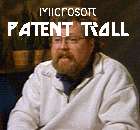

Microsoft should just defect to the side which works to abolish software patents and if not, then shareholders of Microsoft should start criticising the company's strategy. As things stand at the moment, Microsoft is bombarded with patent lawsuits and Groklaw explains why Free software cares about the i4i case which we last mentioned this morning (it goes beyond the Canadian media due to escalation to SCOTUS, which got the lawyers [1, 2] and the MSBBC paying closer attention). To quote Groklaw:
Today is the day scheduled for oral argument before the US Supreme Court in the appeal of the i4i v. Microsoft patent litigation. The appeal is focused on an issue that matters to FOSS a great deal. EFF, Public Knowledge, and the Apache Foundation have filed an amicus brief [PDF] that explains to the court why it matters so much and with such particularity to the FOSS community. I've done it as text for you.
I'll let them explain the details, but the big picture is that US patent law, largely due to the Federal Circuit's broadening of plaintiffs' rights, is hard on defendants and harder still on FOSS defendants, because FOSS uses a development model that doesn't match the patent law as currently interpreted by the Federal Circuit.
The issue before the US Supreme Court is this, in plain English: how hard should it be to prove that a patent that the USPTO has issued is invalid? How about if you have evidence that the USPTO examiner never looked at? Should juries assume that the USPTO got it right? I smile just writing that. With FOSS software, it's almost impossible for an examiner to find prior art, unless it's been patented, which it almost never is, given the restrictions on what examiners can search through. And you may be surprised when you read what the courts require as proof. I am pretty sure that after you read this brief, you'll see how unbalanced the current system is, how it disadvantages FOSS defendants, and hopefully you'll notice some things you can do to help balance out the playing field. I hope the court sees the unfairness too, and I hope they care.
The bottom line for me remains that software and patents need to get a divorce. But anything that we or the courts or Congress can do to ameliorate the strange and damaging tilt toward patent plaintiffs to the detriment of defendants is to the good. The law is supposed to be fair to both plaintiffs and defendants, but with patent law, it absolutely isn't, as the brief will show you. The damage being done to innovation is enormous already, and with Microsoft on a march to rape and pillage FOSS and force the community -- most especially Android -- to pay royalties for patents that could be invalidated in a more fair system but which it can use as anticompetitive weapons unless something is done to shortcircuit their strategy, this case is vitally important.
A software patent case in which Microsoft was accused of wilfully infringing a patent on XML - and forced to suspend sales of Word and Office - reaches the US Supreme Court on Monday afternoon UK time and could have a wide-ranging effect on future litigation.
ON Monday the Supreme Court will consider whether to fundamentally alter the way American patent law is litigated. Specifically, in the context of an otherwise unremarkable patent dispute, the Court has promised to decide the degree to which juries should be allowed to question whether a patent should have been issued at all.
It’s a critical issue: the current approach, under which juries are explicitly discouraged from questioning a patent’s validity, all too often means that dubious patents are nevertheless enforced. That inhibits innovation, the very thing that patent law is supposed to encourage.
[...]
These problems could in theory be fixed with more money. But resources aren’t the only issue. The extent and quality of Patent Office review is also limited by the fact that the process is not adversarial. Indeed, the only parties involved in Patent Office review are the applicant and the applicant’s lawyers — people with an obvious incentive to see the application move forward. Contrast that with litigation, where patent plaintiffs have to square off against very motivated patent defendants.
Comments
twitter
2011-04-20 05:13:34
Yes, the same kinds of charges they made back in the 80's.